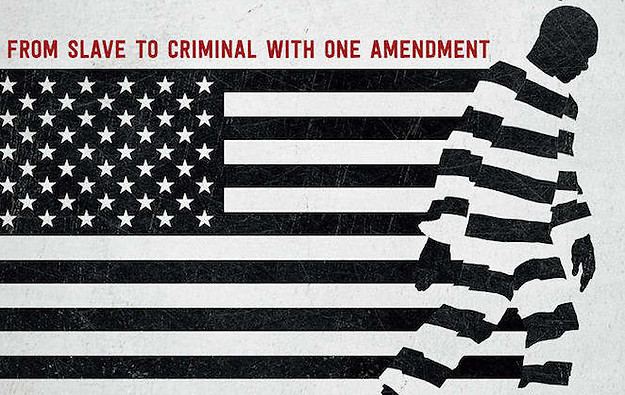The 13th Amendment

Passed by Congress on January 31, 1865, and ratified on December 6, 1865, the 13th amendment abolished slavery in the United States and provides that "Neither slavery nor involuntary servitude, except as a punishment for crime whereof the party shall have been duly convicted, shall exist within the United States, or any place subject to their jurisdiction.".
Systems of Racism
"The myth of black criminality"
"The United States is home to 5% of the world's population, but 25% of the worlds prisoners.Think about that."- Barack Obama
"One out of four human beings with their hands on bars, their hands shackled, in the world, are locked up here, in the land of the free."
1 in 3 Black Men will be jailed
1 in 17 White Men will be jailed
“So many aspects of the old Jim Crow are suddenly legal again once you’ve been branded a felon. And so it seems that in America we haven’t so much ended racial caste, but simply redesigned it.” – Michelle Alexander
In 2016, Filmmaker Ava DuVernay explored the history of racial inequality in the United States in her Netflix documentary "13th". In this documentary, black history is explored in a depth that our education system failed to.
Despite the 13th Amendment being created to free the slaves, the affect it had on the black communities still haunts America today. It states that slavery and involuntary servitude is unconstitutional, "except as a punishment for crime". This allowed for slavery to not be abolished, but reformed. The loophole was exploited immediately and the era of mass incarceration began.
After the civil war, America experienced it's first prison boom. Any and every opportunity to jail African American's was exploited to gain free labor in order to rebuild the economy after the expenses of war. This is where the myth of black criminality began.
Soon after, in the twentieth century, the film, ‘Birth of a Nation’ portrayed the African-American male as violent, animal-like, and evil. The film is widely known for being a catalyst to the rebirth of the Ku Klux Klan.
Fast forward to Nixon- he recruits southern, poor, working-class whites into the Republican fold and criminalizes Blacks. Lee Atwater described this as, “…you’re talking about cutting taxes and all of these things you’re talking about are totally economic things, and the by-product of them is Blacks get hurt worse than whites.”
While Nixon was the first to coin the term “war on drugs,” Reagan was the first to turn the term into a literal war. In Reagan's era, the war on drugs became a part of modern culture, and black people became over represented in the news as criminals and crack addicts. The Nixon and Reagan administrations are responsible for supplying drugs to black communities, and then arresting those suffering from drug addictions- rather than increasing resources for treatment or rehabilitation. By purposely painting black communities as drug ridden, Reagan turned the war on drugs into the war on blacks.
The 1994 Federal Crime Bill, created under Bill Clinton, deployed the latest technology and tactics to make communities safer . It led to the massive expansion of the prison system – it increased state funding for prisons, put 100,000 police officers on the street, and contributed to the exploding prison population. Clinton now realizes that this bill led to hyper-incarceration and was a mistake.
Black people have been put into a series of systems designed to see them fail. By using mass incarceration, our government has made slavery legal again- except this time you don't see it.
Once you acknowledge the deep rooted systemic racism within the criminal justice system you realize slavery is very much alive, just reformed into prison labor.
“We knew we couldn’t make it illegal to be either against the war or black. But by getting the public to associate the hippies with marijuana and blacks with heroin and then criminalizing both heavily, we could disrupt their communities.” – former Nixon domestic policy chief John Ehrlichman
“There are thousands of people in jails right this moment that are sitting there for no other reason than because they’re too poor to get out.” – Michelle Alexander
“We make them their crime. That’s how we introduced them. ‘That’s a rapist. That’s a murderer. That’s a robber. That’s a sex offender. That’s a burglar. That’s a gang leader.’ And through that lens, it becomes so much easier to accept that they’re guilty and that they should go to prison.” – Bryan Stevenson
“People say all the time, ‘well, I don’t understand how people could have tolerated slavery?’ ‘How could they have made peace with that?’ ‘How could people have gone to a lynching and participated in that?’ ‘That’s so crazy, if I was living at that time I would never have tolerated anything like that.’ And the truth is we are living in this time, and we are tolerating it.” -Bryan Stevenson.
